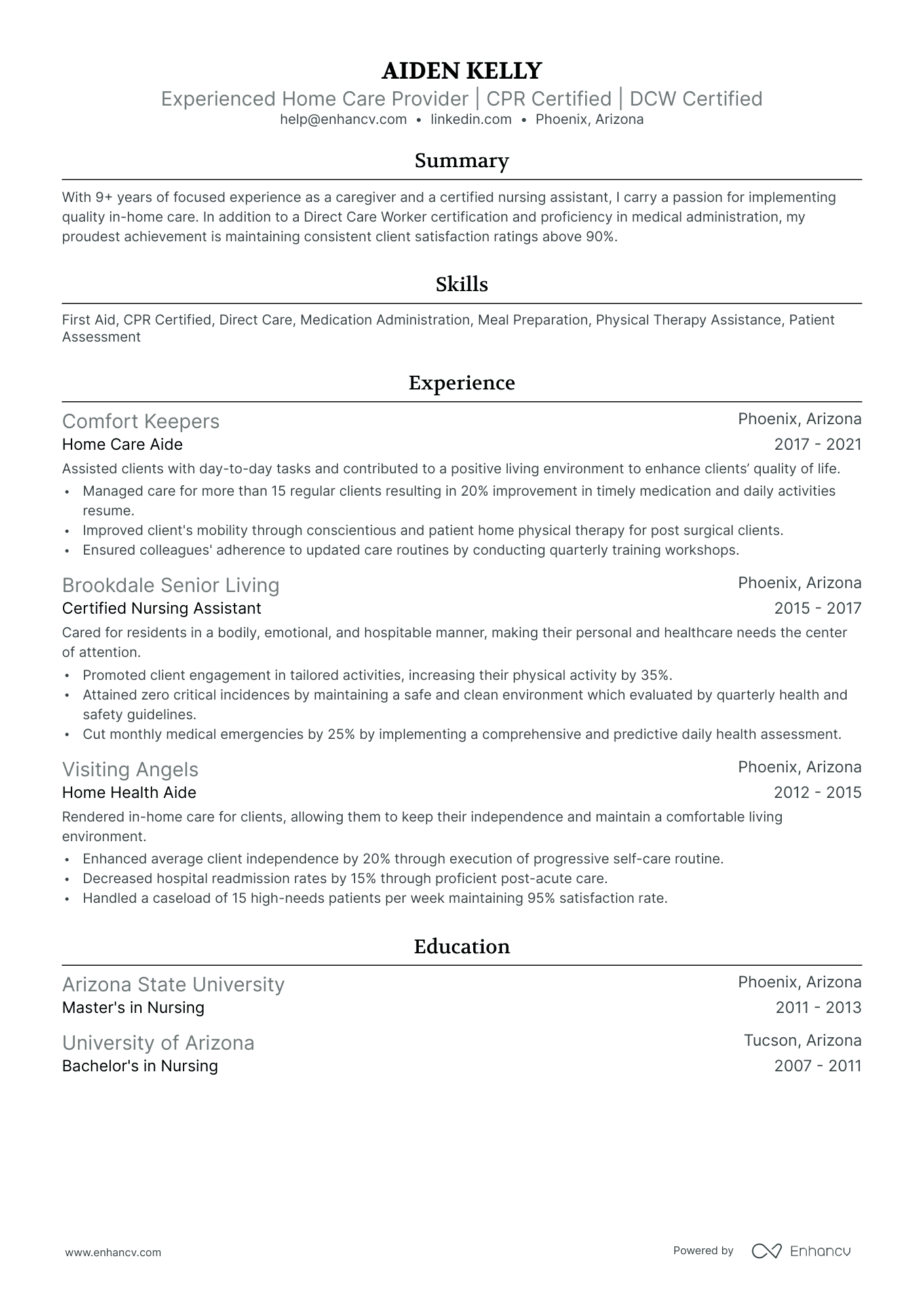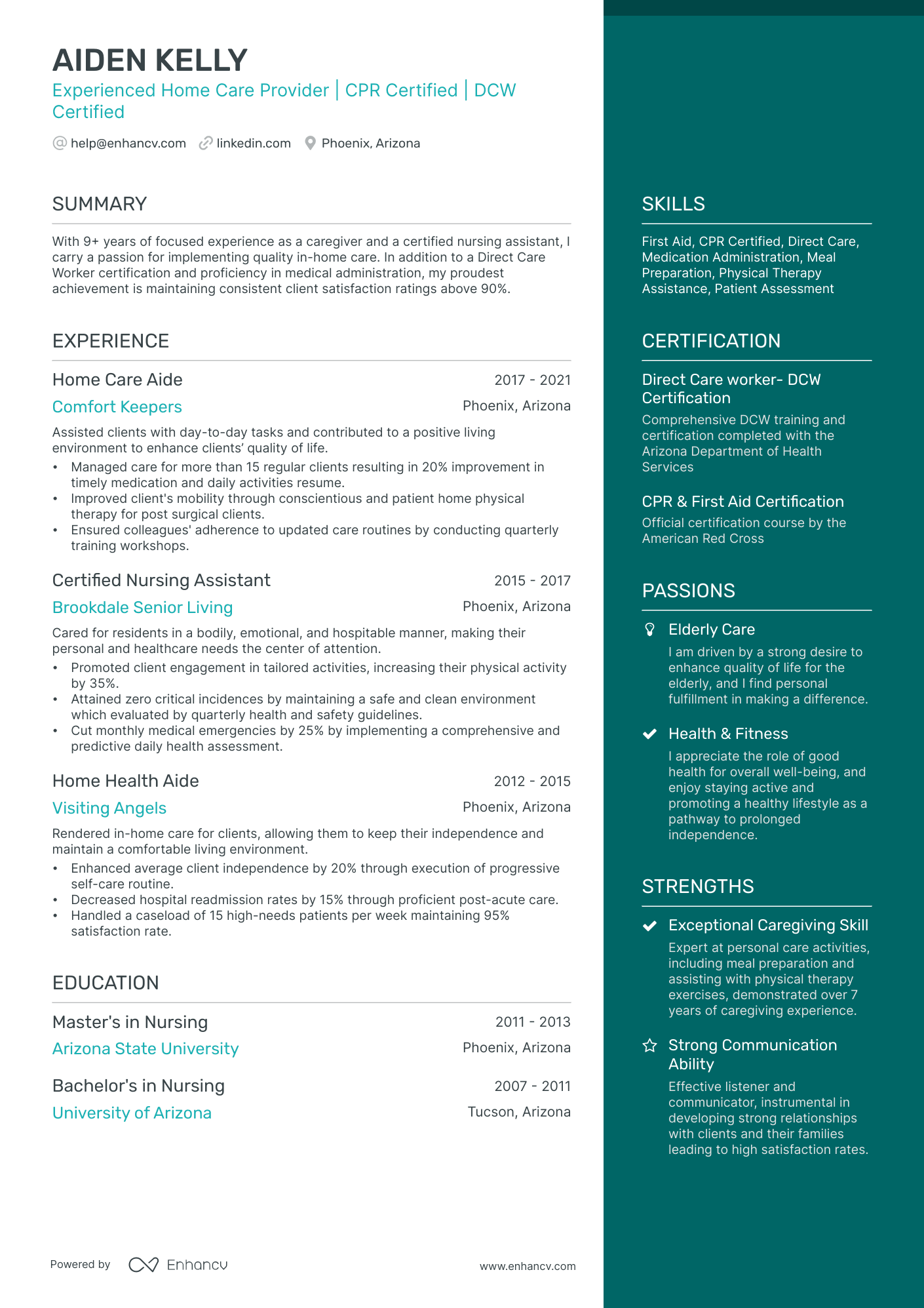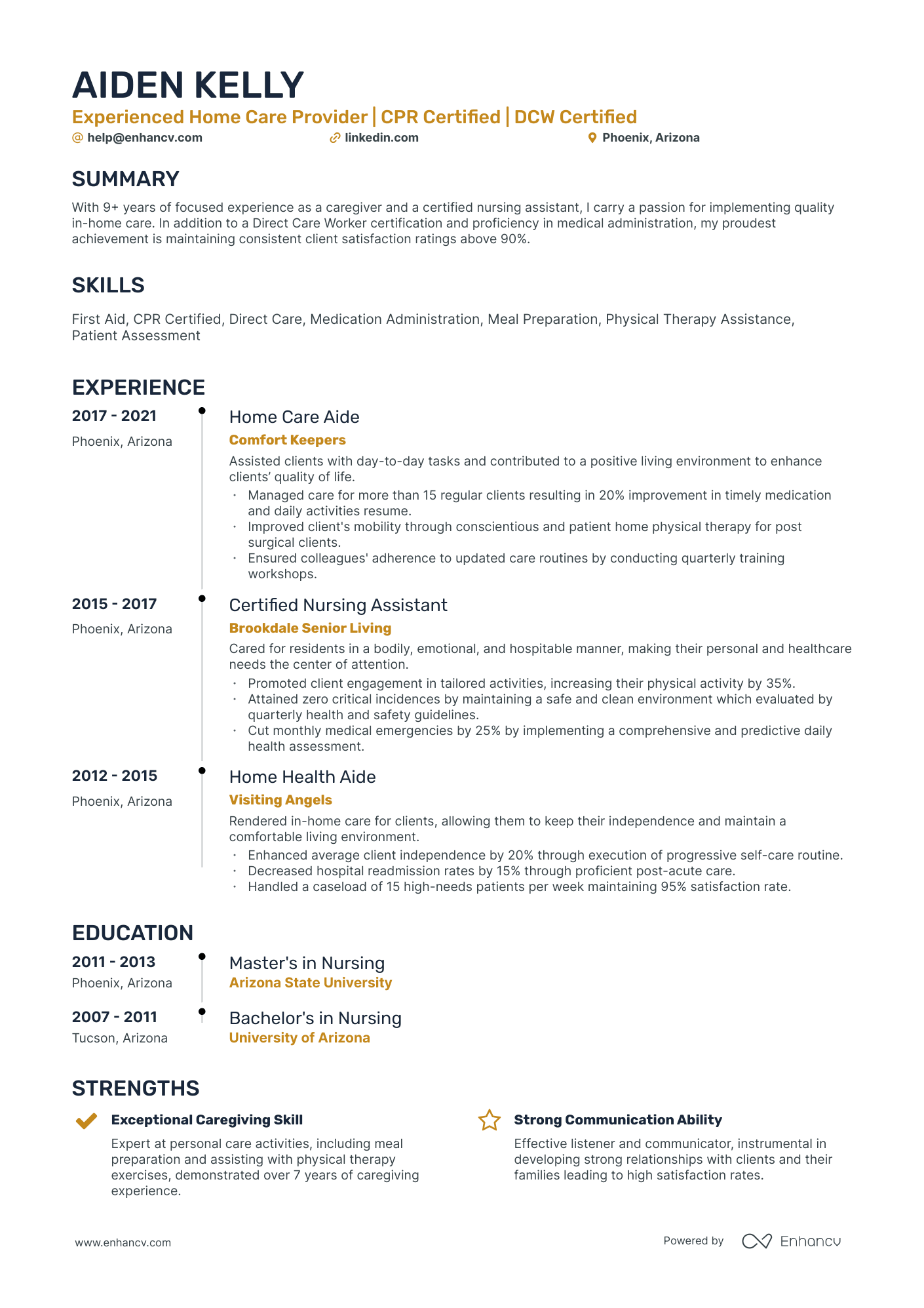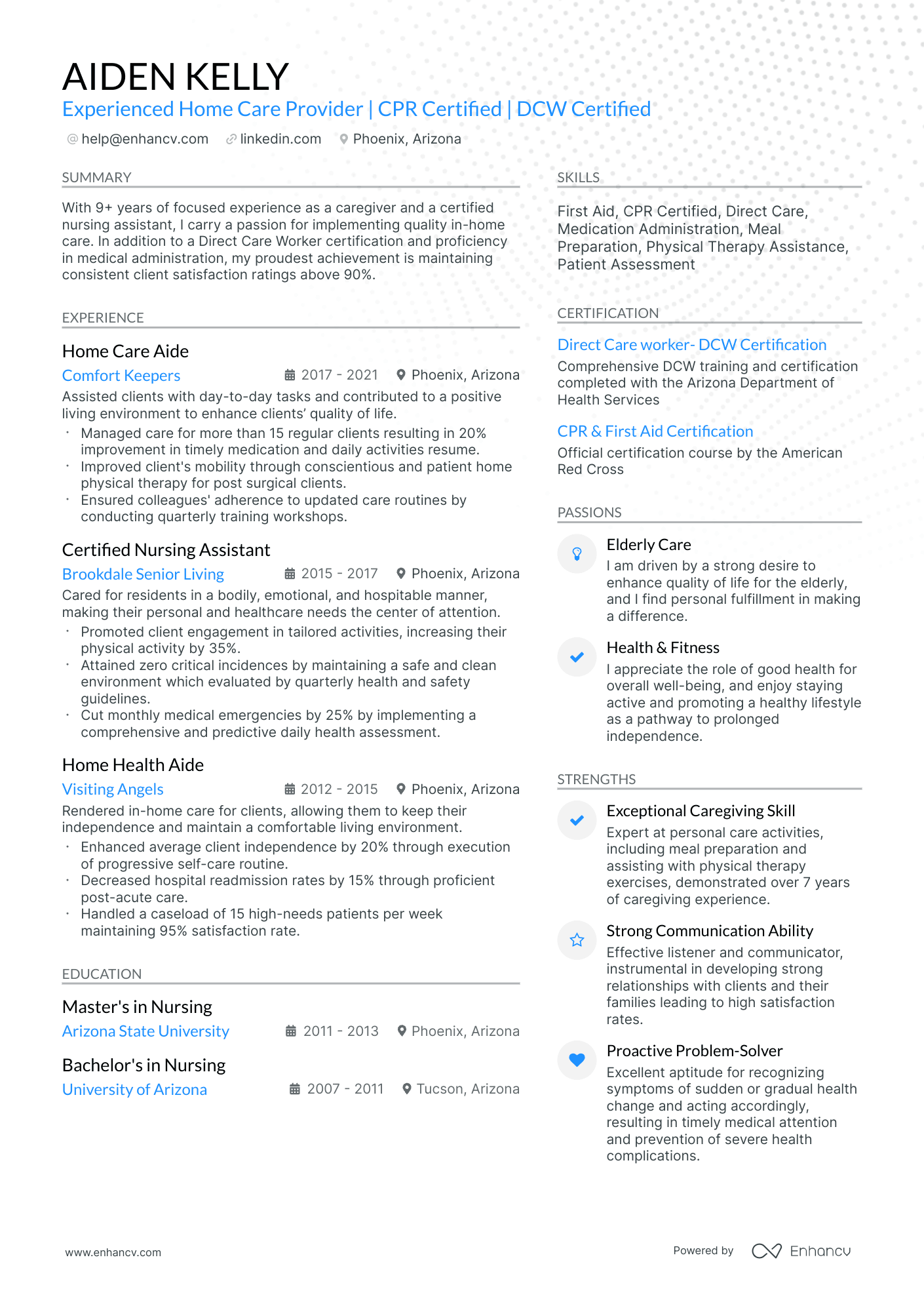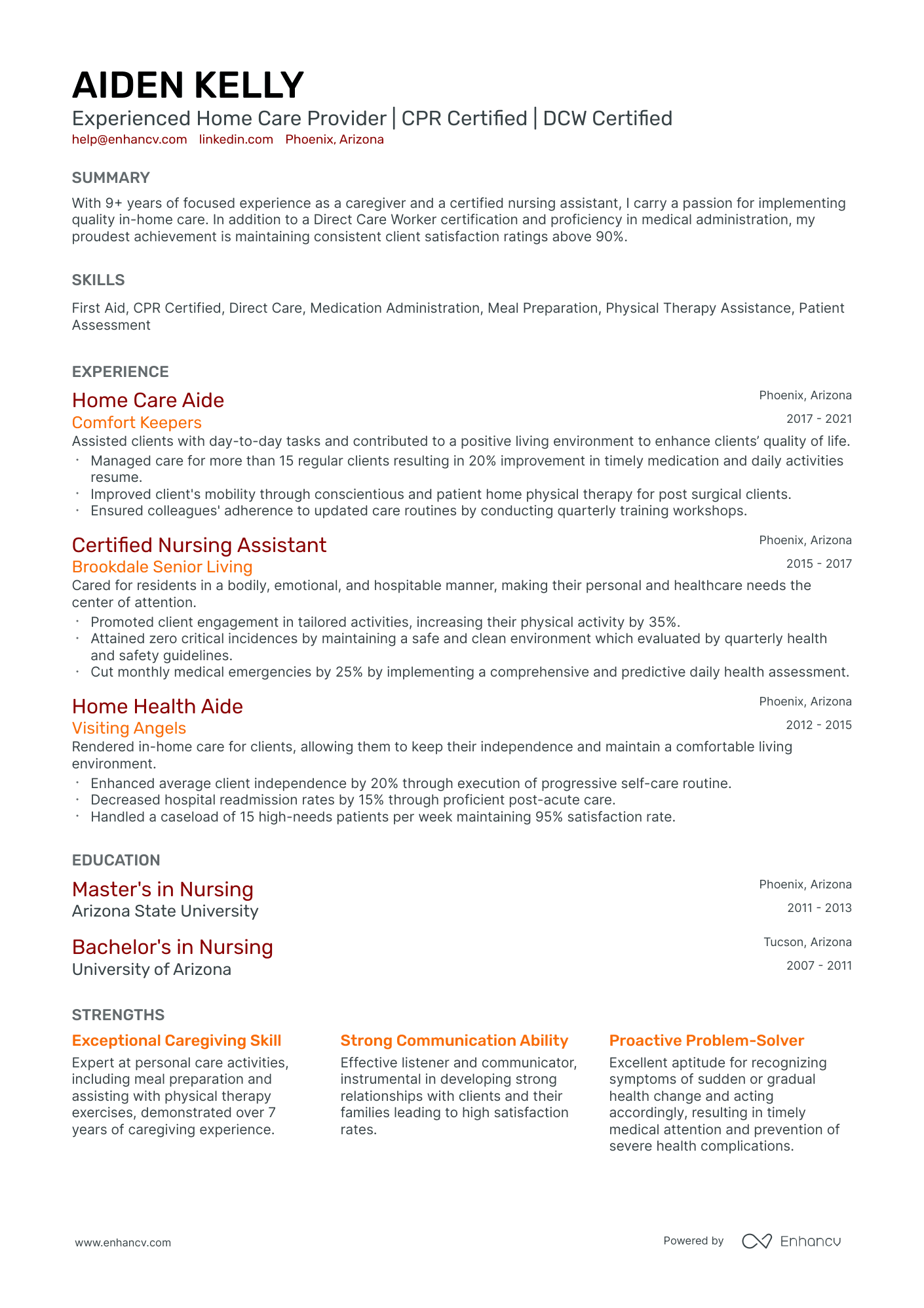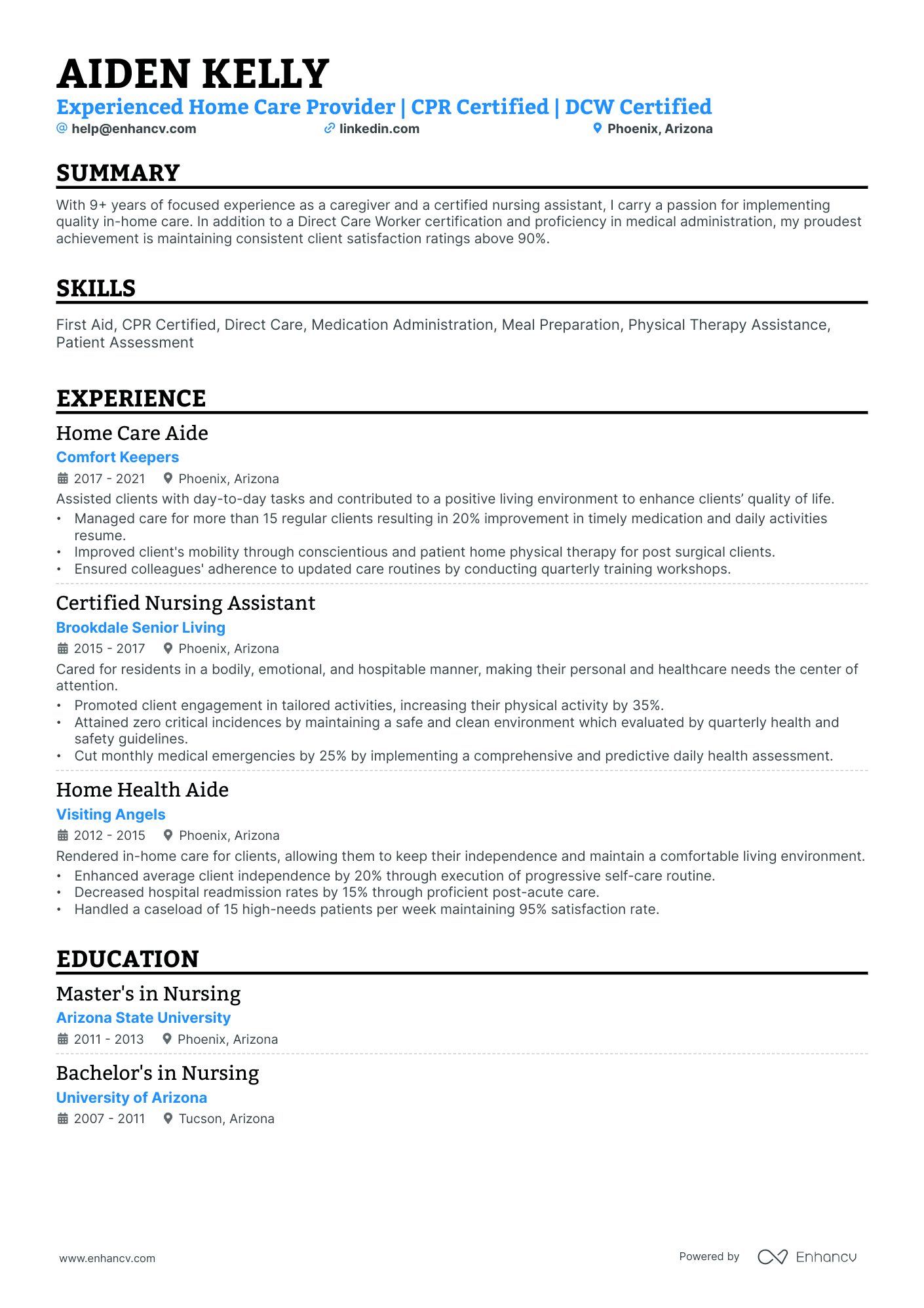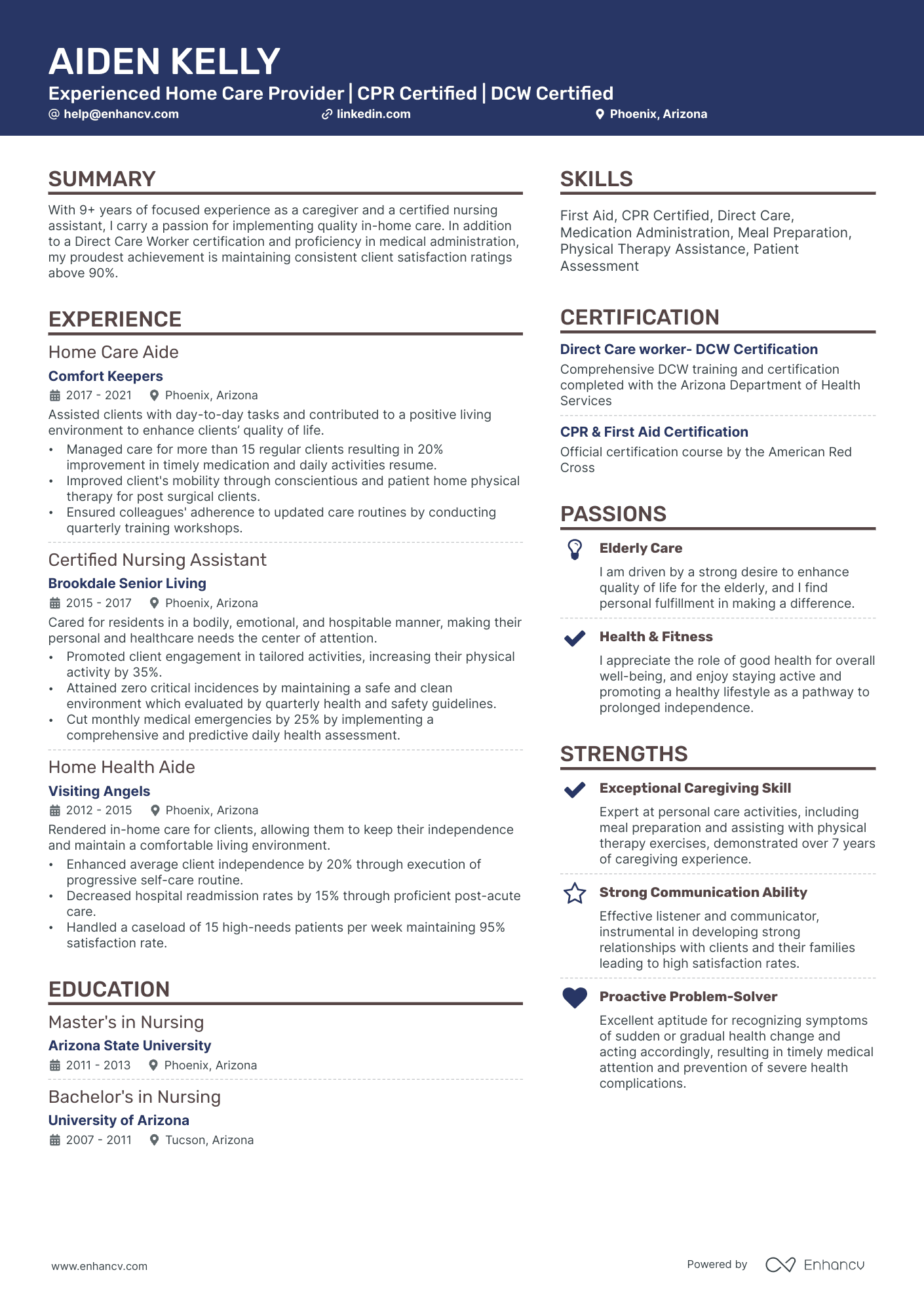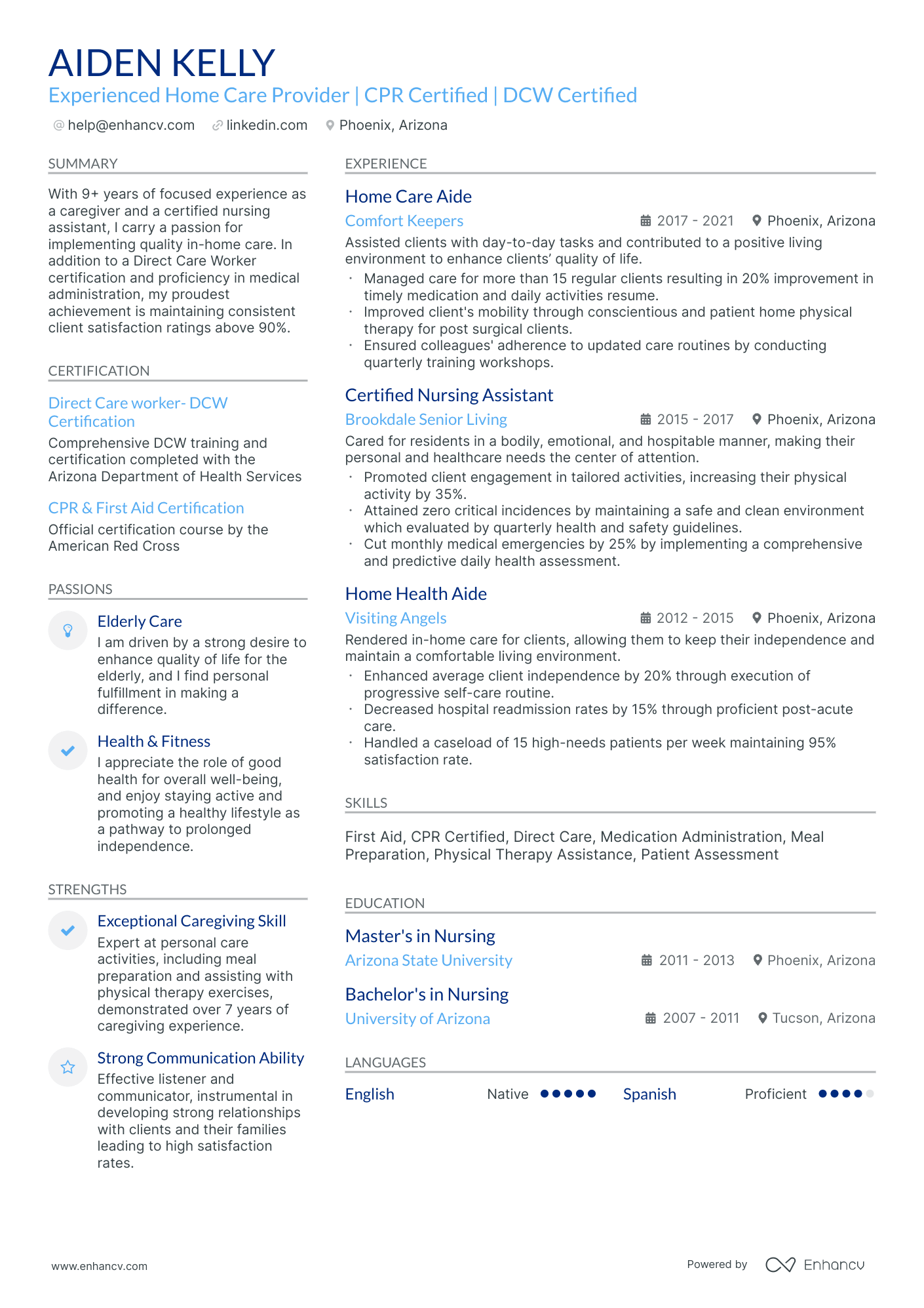First, elderly caregivers often struggle to adequately communicate the extent of their hands-on experience and soft skills, like empathy and patience, in the limited space of a resume. Our guide can assist by offering specific phrasing and structural suggestions that highlight these invaluable qualities and experiences within a concise, professional format.
Dive into this guide to uncover:
- Top-tier elderly caregiver resume samples that have successfully landed candidates in leading companies.
- Strategies to direct recruiters' focus towards your standout experiences, notable achievements, and pivotal skills.
- Guidance on crafting resume sections that align closely with the vast majority of job specifications.
- Insights on harmonizing your elderly caregiver technical prowess with your distinct personality, setting you apart from the competition.
Recommended reads:
Formatting the layout of your elderly caregiver resume: design, length, and more
When it comes to the format of your elderly caregiver resume , you've plenty of opportunities to get creative. But, as a general rule of thumb, there are four simple steps you could integrate into your resume layout.
- If you have plenty of experience, you'd like to showcase, invest in the reverse-chronological resume format. This format focuses on your latest experience items and skills you've learned during your relevant (and recent) jobs.
- Don't go over the two-page limit, when creating your professional elderly caregiver resume. Curate within it mainly experience and skills that are relevant to the job.
- Make sure your elderly caregiver resume header includes all of your valid contact information. You could also opt to display your professional portfolio or LinkedIn profile.
- Submit or send out your elderly caregiver resume as a PDF, so you won't lose its layout and design.
Adjust your resume layout based on the market – Canadian resumes, for example, may follow a unique format.
Upload your resume
Drop your resume here or choose a file. PDF & DOCX only. Max 2MB file size.
Pro tip
If you don't happen to have that much relevant experience for the role, you could select a different format for your resume. Popular choices include:
- functional skill-based resume format - that puts the main focus on your skills and accomplishments;
- hybrid resume format - to get the best of both worlds with your elderly caregiver experience and skills.
The five (plus) definite sections your resume for a elderly caregiver job should include are:
- Header with your headline, contact details, and/or a preview of your work
- Summary (or objective) to pinpoint how your success aligns with the role
- Experience with bullets of your most relevant achievements in the field
- Skills to integrate vital job requirements (both technical and personal)
- Your further dedication to the field, showcased via relevant higher education and/or certifications
What recruiters want to see on your resume:
- Experience and proficiency in providing elderly care, including assisting with activities of daily living.
- Demonstrated skills in managing medications and understanding of common elderly health issues.
- Certifications or training in First Aid and CPR specifically for the elderly.
- Excellent interpersonal and communication skills to build rapport with the elderly and their families.
- Proven ability to handle emergency situations calmly and effectively.
Recommended reads:
Decoding the elderly caregiver resume experience section
Once you've settled on your resume's format, the next step is detailing your professional journey.
Many elderly caregiver professionals grapple with this section, especially when balancing between extensive or limited experience. Here's a roadmap to navigate this:
- Limit bullet points under each job role to six, focusing on high-impact contributions.
- Highlight achievements that resonate with the job's requirements, rather than just listing duties.
- Detail any on-the-job certifications or skills acquired and their relevance to your growth.
- Choose impactful verbs for each bullet, avoiding overused terms like "managed".
- Infuse relevant keywords from the job posting, especially in the context of accomplishments.
For more insights, explore these curated examples from seasoned elderly caregiver professionals:
- Provided personalized care and support to elderly clients, promoting their physical and emotional well-being.
- Assisted with daily activities, including bathing, dressing, medication management, and meal preparation.
- Implemented specialized exercise programs resulting in improved mobility and overall health.
- Monitored vital signs and promptly reported any concerns or changes in health status to healthcare professionals.
- Developed strong relationships with clients and their families, ensuring open communication and trust.
- Maintained a clean and safe environment, preventing accidents and hazards.
- Assisted elderly individuals with daily living activities, fostering independence and enhancing their quality of life.
- Administered medications according to prescribed schedules, ensuring accurate dosage and timely administration.
- Managed household tasks, such as grocery shopping, cleaning, and laundry, enabling a comfortable living environment for clients.
- Organized social activities and outings, promoting socialization and engagement among elderly residents.
- Provided emotional support and companionship, alleviating feelings of loneliness and isolation.
- Collaborated with healthcare professionals to develop and implement personalized care plans.
- Assisted seniors with mobility challenges, utilizing proper lifting and transfer techniques to ensure their safety.
- Documented and maintained accurate records of daily activities, medications, and vital signs.
- Coordinated medical appointments and transportation, ensuring timely and efficient healthcare access.
- Supported clients in managing chronic conditions, such as diabetes and hypertension, through medication reminders and dietary assistance.
- Implemented cognitive stimulation exercises to enhance memory and mental acuity.
- Provided end-of-life care and emotional support to terminally ill patients and their families.
- Assisted elderly clients with personal hygiene and grooming, ensuring their comfort and dignity.
- Managed household chores and meal preparation, resulting in a well-maintained living environment.
- Administered prescribed medications and monitored their effects, reporting any adverse reactions promptly.
- Provided companionship and engaged in stimulating activities, promoting social interaction and mental well-being.
- Assisted with physical therapy exercises, facilitating rehabilitation and improved mobility.
- Coordinated with family members to ensure continuity of care and meet the evolving needs of clients.
- Delivered compassionate care to elderly individuals in their homes, fostering a sense of security and comfort.
- Managed medication schedules and administered complex treatments under the guidance of healthcare professionals.
- Collaborated with multidisciplinary teams to develop comprehensive care plans tailored to each client's specific needs.
- Assisted with therapeutic activities and exercises, promoting physical strength and flexibility.
- Provided respite care for family caregivers, offering them much-needed rest and support.
- Implemented safety protocols to prevent falls and accidents, ensuring a secure environment.
- Supported elderly clients with daily living tasks, including dressing, bathing, and toileting.
- Managed and organized medication schedules, minimizing errors and ensuring adherence to prescribed treatments.
- Monitored and recorded vital signs, promptly reporting any abnormalities to healthcare professionals.
- Collaborated with physical therapists to implement personalized exercise programs, resulting in improved strength and mobility.
- Assisted in meal planning and preparation, accommodating dietary restrictions and preferences.
- Offered emotional support and companionship, engaging in meaningful conversations and activities.
- Provided specialized care for elderly individuals with Alzheimer's disease and dementia, employing techniques to promote cognitive function and reduce agitation.
- Assisted with personal hygiene and grooming, ensuring comfort and maintaining a sense of dignity.
- Administered medications accurately and on schedule, working closely with healthcare professionals to adjust dosages as needed.
- Implemented memory-enhancement exercises and activities, improving cognitive abilities and quality of life.
- Created customized meal plans based on dietary restrictions and nutritional needs, resulting in improved overall health.
- Communicated effectively with family members, providing regular updates on their loved one's condition and well-being.
- Assisted elderly clients with mobility devices, such as walkers and wheelchairs, ensuring their safe and comfortable use.
- Managed medication administration, organizing pillboxes and monitoring medication refills.
- Supported individuals with chronic conditions, implementing strategies to manage symptoms and improve daily functioning.
- Organized recreational activities and outings, fostering social engagement and a sense of community.
- Provided emotional support during difficult life transitions, offering empathy and understanding to clients and their families.
- Maintained a clean and organized living space, enhancing safety and comfort for clients.
- Assisted elderly individuals in a residential care facility, promoting independence and maintaining a high quality of life.
- Administered medications and monitored their effects, updating healthcare professionals on any changes or concerns.
- Collaborated with occupational therapists to implement adaptive equipment and techniques, enhancing functional abilities.
- Organized social events and outings, encouraging socialization and participation among residents.
- Developed personalized care plans based on individual needs and preferences.
- Responded promptly to emergencies, providing first aid and alerting medical personnel when necessary.
- Provide compassionate care and support to elderly clients in their homes, ensuring their safety and well-being.
- Assist with daily activities, including dressing, feeding, medication reminders, and light housekeeping.
- Monitor vital signs and report any changes or concerns to healthcare professionals.
- Implement fall prevention strategies and maintain a hazard-free environment.
- Build strong relationships with clients and their families, fostering trust and open communication.
- Coordinate medical appointments and transportation, ensuring timely access to healthcare services.
Quantifying impact on your resume
<ul>
Tips for elderly caregiver newcomers launching their careers
Lacking extensive experience for that elderly caregiver role? No worries.
Sometimes, hiring managers go for the unexpected candidate when they see potential.
Here's how to convince them you're the right fit:
- Opt for the functional skill-based or hybrid formats to highlight your unique professional value.
- Always tailor your elderly caregiver resume to emphasize the most critical requirements, usually listed at the top of the job ad.
- Compensate for limited experience with other relevant sections like achievements, projects, and research.
- In your elderly caregiver resume objective, pinpoint both your achievements and how you envision your role in the position.
Recommended reads:
Pro tip
When detailing your career journey, there's no need to delve deep into early roles. Prioritize what resonates with recruiters. For senior positions, a decade-long retrospective can effectively illustrate your evolution.
Decoding the essence of your elderly caregiver resume: hard and soft skills
Every job description communicates the desired hard and soft skills. These skills are the backbone of your application.
Hard skills are your tangible, technical proficiencies, often validated through certifications or hands-on experience. On the other hand, soft skills reflect your interpersonal abilities and how you navigate diverse work environments.
To effectively spotlight these skills on your resume:
- Create a distinct section for technical skills, listing the most relevant ones for the job.
- Highlight your strengths by weaving in achievements that underscore specific skills.
- Strike a balance between hard and soft skills to present a well-rounded profile.
- If multilingual, include a language proficiency section, emphasizing the interpersonal advantages it brings.
Stay tuned for a deep dive into the most in-demand hard and soft skills in the industry.
Top skills for your elderly caregiver resume:
Medication Management
Personal Care Assistance
Mobility Assistance
Meal Preparation
Basic First Aid
Emergency Response Systems
Home Safety Assessment
Gait and Balance Training
Health Monitoring Devices
Assistive Technology
Empathy
Patience
Communication
Problem-Solving
Time Management
Attention to Detail
Emotional Support
Adaptability
Conflict Resolution
Companionship
Pro tip
Targeting the needed job ad skills doesn't have to end with the skills section. You can talk about your related certifications, interests or additional experience via projects or volunteering, where you picked up those skills, too.
Optimizing the education and certification sections of your elderly caregiver resume
Your education and certification sections can be game-changers on your elderly caregiver resume, showcasing your commitment to professional growth.
For the education section:
- Highlight advanced education, noting the institution and duration.
- If you're currently studying, mention your expected graduation date.
- Exclude degrees that don't align with the job's requirements.
- If relevant, delve into your academic journey, spotlighting significant achievements.
When listing degrees and certifications:
- Feature those directly relevant to the role.
- Highlight recent and significant knowledge or certifications at the top of your resume.
- Provide essential details like the issuing institution and dates for credibility.
- Avoid listing irrelevant degrees or certifications, such as your high school diploma or unrelated specializations.
Remember, even if you're tempted to omit your education or certifications, they can offer a competitive edge, signaling a long-term commitment to the industry.
Best certifications to list on your resume
Pro tip
Listing your relevant degrees or certificates on your elderly caregiver resume is a win-win situation. Not only does it hint at your technical capabilities in the industry, but also at a range of soft skills, including perseverance, adaptability, and motivation.
Recommended reads:
Should you add a summary or objective to your elderly caregiver resume?
Choose between:
- Resume summary to match job needs with your top wins.
- Resume objective to share your career goals.
Both should tell recruiters about your best moments. Keep them short, around five sentences. Check out our sample structures for guidance.
Resume summary and objective examples for a elderly caregiver resume
With a decade of professional experience in healthcare, I bring a wealth of clinical expertise and compassionate care to elderly patients. My background includes working in both residential and hospital settings, providing assistance with daily living activities, managing medications, and coordinating with medical professionals. One of my proudest moments was leading a team that reduced hospital readmission rates by 25% over two years.
Possessing 8+ years' experience as an RN, I've developed exceptional skills in patient care and public health advocacy. Particularly effective in managing complex medical conditions for the elderly, I've been recognized for improving patient outcomes and reducing emergency room visits. Successfully launched a community health initiative, making healthcare accessible to disadvantaged seniors.
Transitioning from a career in teaching, where I honed skills in communication, patience, and problem-solving, I am eager to apply these skills in elder care. Having cared for an aging parent myself, I understand the intricacies involved in ensuring dignified and respectful care. A dedicated, empathetic caregiver who is committed to providing superior care and enhancing quality of life for the elderly.
As a social worker for over 12 years, I have honed my skills in empathy, compassion, and patience. I am now seeking to transition into elderly care, where I can use these transferable skills to provide comfort, companionship, and medical aid. My ability to handle crisis situations calmly and effectively will be instrumental when dealing with emergencies or health issues among senior residents.
As a recent nursing graduate, I aim to leverage my education, internship experience, and inherent compassion to provide top-tier care for the elderly. I anticipate applying my knowledge in geriatric care and wellness promotion while developing strong relationships with patients and their families. Adept at using modern medical tools and software applications.
Driven by a desire to make a positive difference in people's lives, I am starting my journey in elderly care. Excited to apply my psychology degree and interpersonal skills in supporting seniors’ emotional and physical well-being. With a strong understanding of mental health issues prevalent in the aged population, I seek to create safe and nurturing environments for elderly residents.
Additional elderly caregiver resume sections for a personalized touch
To further personalize your elderly caregiver resume, consider adding sections that reflect your unique qualities and achievements.
Popular choices include:
- Projects to showcase significant work achievements.
- Languages to indicate proficiency levels.
- Awards to celebrate industry recognitions.
- Hobbies and Interests to share personal passions.
Key takeaways
- Keep your elderly caregiver resume clear and organized with key sections.
- Only include relevant details. Space is limited.
- Support your achievements with both hard and soft skills.
- Detail your experience, focusing on your industry expertise.
- Highlight the most relevant certifications to show your dedication to the field.

